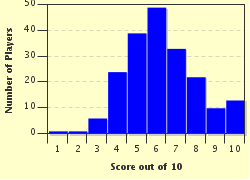Quiz Answer Key and Fun Facts
1. What Jewish holiday is the most like Christmas? It lasts an evening and a day, involves the giving of gifts, special scripture is read, special cookies are baked, children put on pageants, and there is general revelry. It's also a time of sharing meals with those in poverty. It also shares one important feature with Halloween, rather than Christmas, but its general spirit of festivity shares more with Christmas than any other holiday.
2. True or false: an adult cannot convert to Orthodox Judaism.
3. In what direction is Hebrew read?
4. Most of the Jewish scriptures are originally in Hebrew, but the Books of Daniel and Ezra are originally in another Language. What is it?
5. While Jews say a blessing over food before eating, grace, or thanksgiving for a meal, is said after it is eaten, and it is much lengthier than a typical Christian "grace" prayer.
6. Most North American non-Orthodox synagogues charge members a yearly membership fee, and send tickets to the High Holy Services only to those who are dues-paying members.
7. What was the day-to-day language of Jews from Central and Eastern Europe (Ashkenazim), before they were allowed to assimilate after WWII?
8. What food(s) are/is forbidden to Ashkenazim during Passover?
9. "Bar Mitzvah" refers to what, exactly?
10. Pikuach Nefesh is a concept that allows one to break a commandment to save a life. Which of the following would NOT be an example of Pikuach Nefesh?
Source: Author
RivkahChaya
This quiz was reviewed by FunTrivia editor
agony before going online.
Any errors found in FunTrivia content are routinely corrected through our feedback system.

